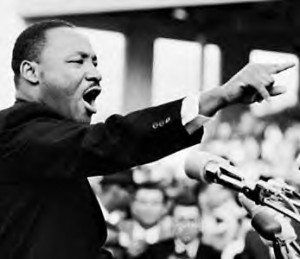Moments before Martin Luther King, Jr., was assassinated by a sniper's bullet, the radical prophet picked a raucous, uproarious pillow fight with his buddies in their Memphis motel room. Such was the mirth and glee that spilled out of the room that when the shot rang out, his friends assumed he was clowning around as he stumbled through the door.
King had just asked a young saxophonist to play his favorite gospel song, "Take My Hand, Precious Lord."
King died, lying in his own blood, in the arms of a friend, a failure.
King died marginalized from many of the very people who lauded him during his height of popularity during the Civil Rights Movement. He died with ever-decreasing popularity among black and white Americans alike for his theological and political stands. He died without ever coming close to realizing his dreams.
And this is exactly what made him so great.
With King at the cultural forefront of the Civil Rights Movement, African-Americans put an end to overt Jim Crow segregation, and this is nothing to downplay. Nor would it be right to downplay what a watershed the Civil Rights Movement proved to be in the United States. But, equality has yet to be achieved and the fires of racism still throw dark shadow puppets on walls in our economic and political systems. To paraphrase King, African-Americans may be able to sit at lunch counters with whites, but what good does it do them if they can't afford to buy a hamburger.
King failed. But not achieving true racial equality wasn't his greatest failure. His greatest failure came when he returned to his roots, his radical gospel roots, for in his final years, his positions on the Vietnam war and ending poverty pushed him into closer to obscurity and unpopularity. When King returned to his gospel roots, steeped in the biblical narratives of justice and exodus, he began to preach for equity between the rich and the poor, and for solidarity between the poor of all races.
And he damned America, fiercely, for her violence and for her injustice.
Two weeks before he was assassinated, King preached this, "You know, Jesus reminded us in a magnificent parable one day that a man went to hell because he didn't see the poor. And I come by here to say that America, too, is going to hell, if we don't use her wealth. If America does not use her vast resources of wealth to end poverty, to make it possible for all of God's children to have the basic necessities of life, she, too, will go to hell."
Nowhere is King's failure more apparent than in this sermon, preached in Memphis to rally striking public employees (of the American Federation of State, County and Municipal Employees) during the Memphis Sanitation Strike. Today, we hear King's words against the backdrop not of Memphis but of Wisconsin, where public employee rights are again under siege, and we realize just how little we have traveled down the road of justice and freedom, how very much we still dwell in the wilderness, if not Egypt.
We hear King's strident condemnation of the American war against the backdrop of our own protracted war efforts, deep in the heart of oil country, and against new efforts in Libya.
We hear King's words echoing as we peel off billions of dollars in aid to the poor while dropping billions of dollars of bombs across the world.
If we are not aware of King's failures — and ours — then we have co-oopted King's legacy to make us feel better, to give us a day off from work in January and to decorate our postage stamps. If we are not quickened by King's words, then America has successfully sanitized as a civil saint this nation's most dangerous man of the late 20th century.
It might seem odd to speak of King's failure on the anniversary of his death, when we should perhaps be more given to memorializing him. But, I suspect, he probably knew he would fail, too. Calling on a consumeristic culture to change its ways, to redistribute the wealth, to care for the least of these leads to two places: failure and death. One cannot confront the bedrock of a nation without that nation's leaders taking notice. Jesus teaches us that. King, I think, knew that, and some say he could feel the assassin creeping closer in his last years of life.
But what makes a prophet is not success. It is the person whose feet move in the morning towards an ideal despite knowing that it can never be attained and that its pursuit leads to a cross. The power, the triumph is that those blessed feet still moved.
The Christian faith, like King's quest, is ultimately a futile, for it too calls for an end to oppression, the abolition of all slavery and the uplift of the poor. Like King, Jesus too called for turning the establishment on its head. Like King, Jesus too was assassinated by a political machine that didn't blink twice to do so.
I doubt whether any of these men's goals are indeed possible, completely. But such futility does not impinge on the hope for the future. Facing the futility is what makes success so sweet and defeat bearable. Acknowledging that the task is insurmountable doesn't undermine the value of the task itself.
In the end, King, I think, teaches us that, about the power of facing futility. And his call, like Jesus', can be irresistible, and scary as hell, if we have ears to hear.
Sadly, though, through the battles over public employee rights throughout America and the unchecked wars this nation is conducting throughout the world, it seems like King's legacy is ending, like his life, with a pillow fight.
The primary source of the opening anecdote is an American Radioworks documentary, further proof of the importance of public radio.
